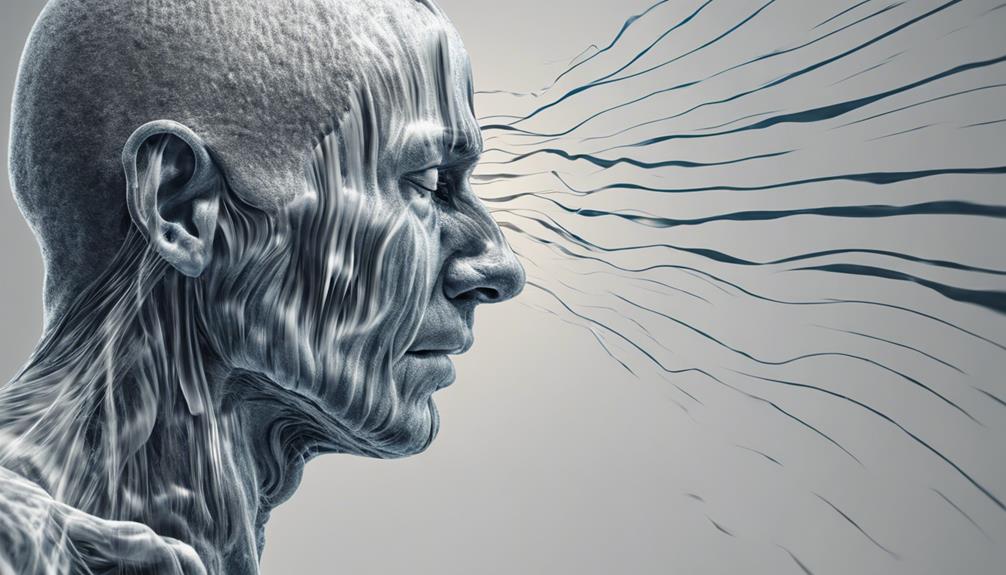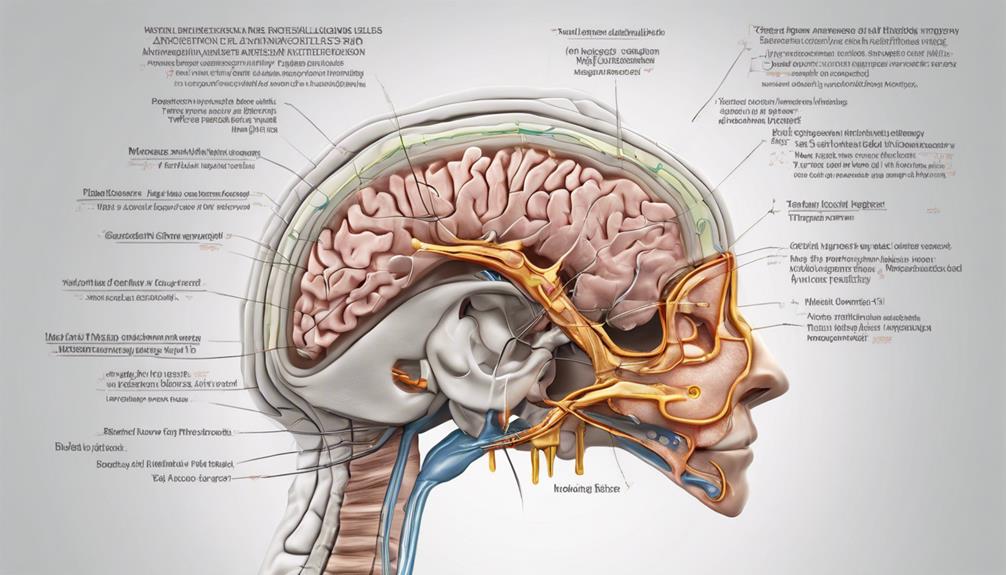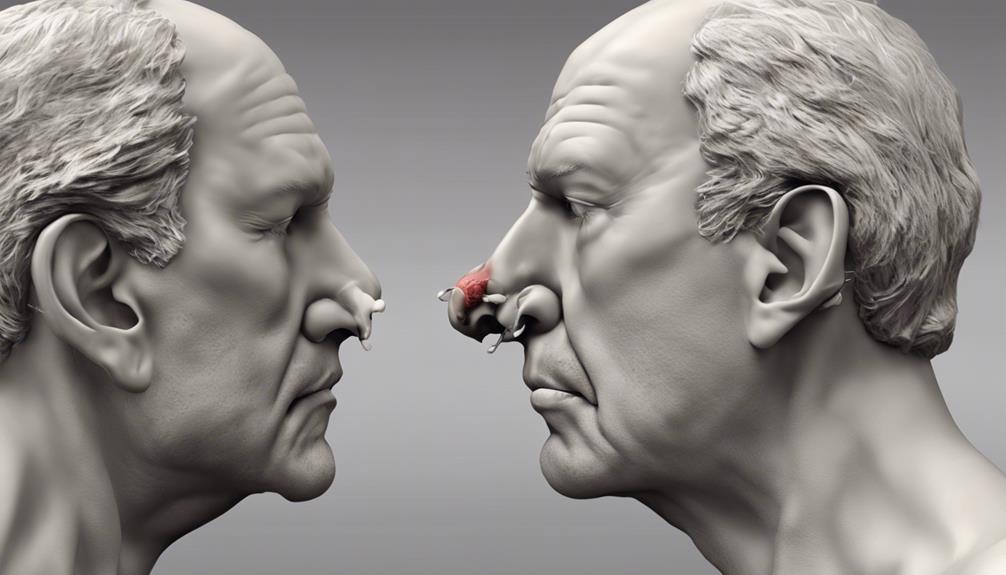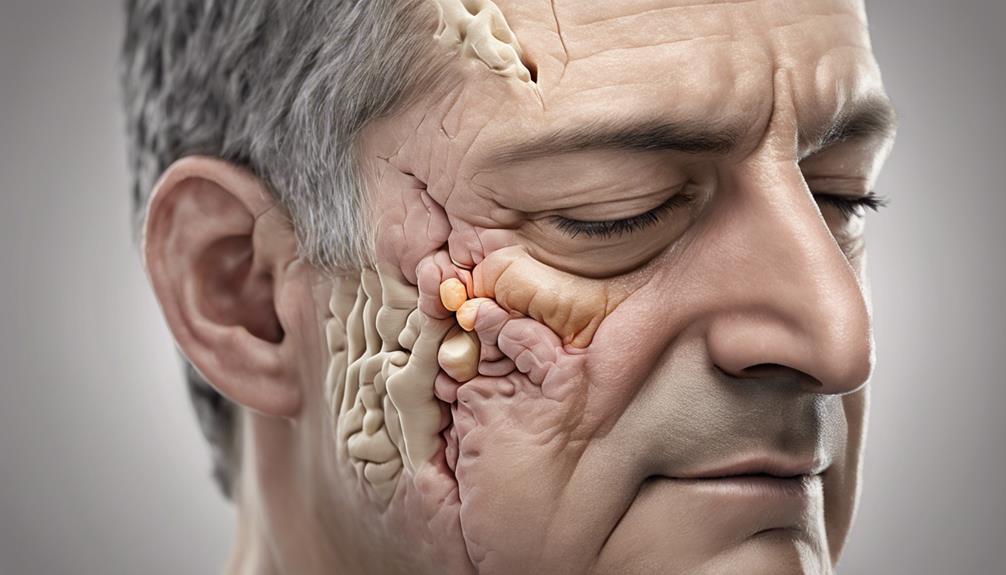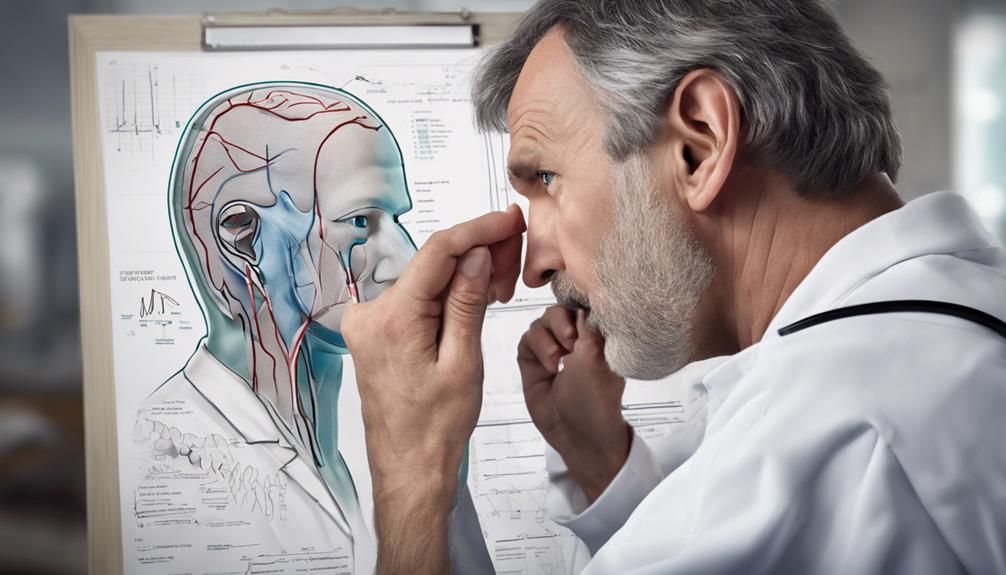Imagine this scenario: as you go about your normal daily activities, suddenly, a blow to the head changes everything.
Have you ever wondered how being hit on the head can lead to hearing loss? Well, the connection might surprise you.
Let's explore the intricate relationship between head injuries and auditory impairments, shedding light on the mechanisms at play.
Stay tuned to uncover the mysteries behind this unexpected link and discover what steps can be taken to address this issue effectively.
Key Takeaways
- Head injuries disrupt the auditory pathway, leading to hearing loss.
- Symptoms like dizziness, tinnitus, and headaches indicate auditory damage.
- Treatment with hearing aids and customized care can improve outcomes.
- Prevent head injuries by wearing protective gear and seeking immediate medical attention.
Mechanisms of Head Trauma-Related Hearing Loss
Head injuries can lead to hearing loss through various mechanisms that involve damage to the auditory pathway from the outer ear to the auditory cortex.
Traumatic brain injury (TBI) can result in hearing impairment by affecting the delicate structures within the inner ear. In cases of head trauma, the inner ear's hair cells, responsible for translating sound vibrations into electrical signals, can sustain damage. This damage to the hair cells can impede the proper transmission of auditory information along the auditory pathway to the brain for processing.
Additionally, disruptions in the auditory pathway caused by head injuries can interfere with the brain's ability to interpret sound signals correctly. These disruptions may manifest as difficulties in perceiving sounds or understanding speech post-head injury.
Therefore, head trauma-related hearing loss can stem from both structural damage within the ear itself and neurological disturbances that impact the processing and interpretation of sound information.
Symptoms of Auditory Damage Post-Head Injury

Symptoms of auditory damage following a head injury typically encompass various manifestations, including dizziness, vertigo, tinnitus, chronic nausea, and headache. These symptoms can be indicative of underlying hearing issues that may arise after a traumatic brain injury (TBI). Below is a table summarizing common symptoms of auditory damage post-head injury:
| Symptom | Description | Potential Impact |
|---|---|---|
| Dizziness | Sensation of lightheadedness or unsteadiness, often accompanied by a spinning feeling. | Can affect balance and daily activities. |
| Vertigo | Feeling of movement when stationary, leading to a sense of spinning or swaying. | Disrupts spatial orientation and coordination. |
| Tinnitus | Ringing, buzzing, or hissing sounds in the ears without an external source. | Interferes with hearing and concentration. |
| Chronic Nausea | Persistent feeling of queasiness or stomach upset, lasting for an extended period. | Impacts overall well-being and quality of life. |
| Headache | Pain or discomfort in the head or neck region, varying in intensity and duration. | Can be debilitating and affect daily functioning. |
Understanding these symptoms is crucial for early detection and proper management of potential hearing loss following a head injury.
Treatment Options for Head Injury-Induced Hearing Loss
Treatment options for head injury-induced hearing loss encompass a range of medical and rehabilitative approaches that aim to improve auditory function and quality of life. Hearing aids are pivotal in managing hearing loss following a head injury. These devices can significantly enhance communication, independence, and overall well-being for individuals with traumatic brain injury (TBI)-related hearing loss. Specialized hearing aids tailored to address specific challenges can offer substantial benefits.
Seeking a hearing consultation is crucial to determine the most suitable treatment for head injury-induced hearing loss. Greentree Audiology, for instance, provides customized solutions to tackle various hearing loss issues linked to head injuries. By combining medical interventions with rehabilitative strategies and utilizing advanced technologies like specialized hearing aids, individuals can experience improved auditory outcomes and enhanced quality of life post-head injury.
The key lies in early intervention and personalized care to address the unique needs of each individual with head injury-induced hearing loss.
Understanding TBI-Related Hearing Impairments
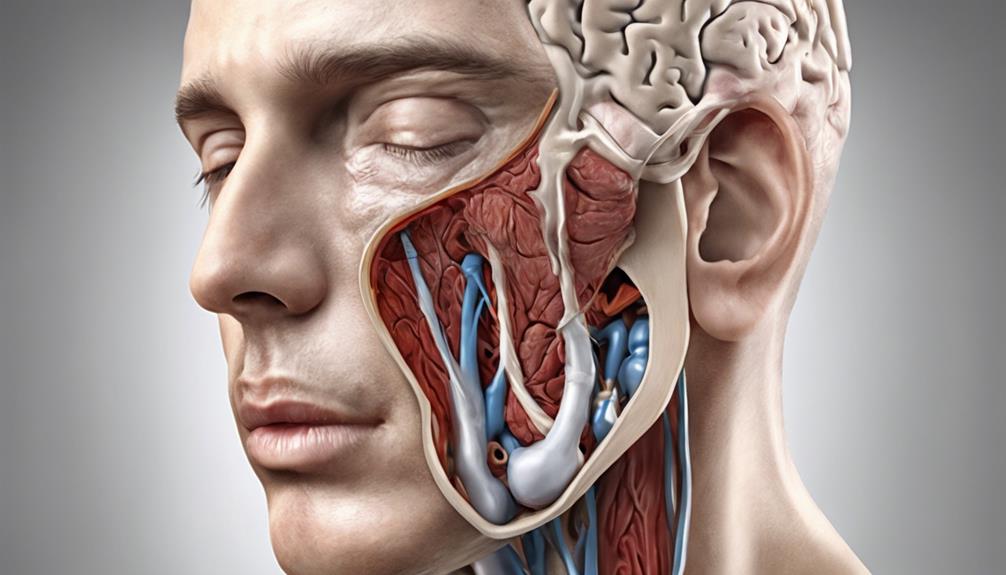
After discussing treatment options for head injury-induced hearing loss, it's crucial to explore the complexities of TBI-related hearing impairments. Traumatic brain injury (TBI) can result in various ear issues, with hearing loss being a common problem. Damage can occur along the auditory pathway, from the outer ear to the auditory cortex, following a head injury.
Even mild concussions have the potential to cause changes in the auditory pathway or ear damage, leading to hearing impairments. Ruptured eardrums or damage to delicate hair cells within the ear can also contribute to hearing loss post-head injury. In cases of severe head trauma, disruptions in the brain regions responsible for processing sound can lead to profound hearing impairments.
Understanding the intricate relationship between TBI and hearing loss is crucial in providing effective care for individuals dealing with the consequences of head injuries.
Preventative Measures for Head-Related Hearing Issues
To prevent head-related hearing issues, wearing protective headgear during activities such as sports or work is crucial. Head injuries sustained during these activities can lead to hearing loss, emphasizing the importance of preventive measures.
Regularly checking and maintaining safety equipment, like helmets and seatbelts, can significantly reduce the risk of head trauma that may impact hearing health. Additionally, avoiding risky behaviors such as speeding and reckless driving can lower the chances of sustaining head injuries that could affect hearing.
Seeking prompt medical attention after a head injury is also essential. Early detection and treatment can prevent or minimize potential hearing loss resulting from head trauma. Furthermore, educating oneself and others about the risks of head injuries and the importance of preventive measures can raise awareness and promote injury prevention within the community.
Frequently Asked Questions
Can Hitting Your Head Cause Hearing Loss?
Yes, hitting your head can cause hearing loss. Head injuries can damage crucial parts for hearing, such as the outer, middle, and inner ear. This damage can lead to issues like ruptured eardrums, harm to ossicles or hair cells, and disruptions in auditory pathways.
Impact from head trauma can result in reduced sound understanding due to disruptions in absorbing and processing soundwaves. Assessing hearing post-injury is vital to identify and treat resulting hearing loss.
Why Do My Ears Feel Clogged After Hitting My Head?
After hitting our heads, we may experience clogged ears due to changes in pressure, fluid buildup, or inflammation affecting the Eustachian tube function. This sensation can result from damage to inner ear structures or the auditory pathway, impacting hearing and causing ear fullness.
Other symptoms like dizziness, ringing in the ears, or hearing loss may accompany clogged ears post-head injury. Seeking prompt medical evaluation is essential to assess ear damage accurately and receive appropriate treatment.
Can Trauma Cause Hearing Loss?
Yes, trauma can indeed cause hearing loss. When the head suffers a significant impact, vital structures responsible for hearing can sustain damage. This damage may include ruptured eardrums, harm to delicate hair cells, or blockages in the auditory pathways.
The forceful impact can disrupt the conversion of soundwaves into electrical signals for the brain. Any issues in the outer, middle, or inner ear can affect sound absorption and processing, leading to hearing difficulties.
Can Sudden Hearing Loss Reversed?
Yes, sudden hearing loss can be reversible depending on the cause and promptness of intervention. Seeking immediate medical evaluation is crucial for determining the underlying issue and the appropriate treatment. Medications or surgical procedures may be options for restoring hearing.
Rehabilitation and therapy can also aid in improving hearing outcomes post-head trauma. Early detection and intervention play a vital role in the potential reversibility of sudden hearing loss.
Conclusion
In conclusion, head injuries can indeed cause hearing loss, whether temporary or permanent. While it's important to seek treatment and support for any auditory damage following a head trauma, some may argue that preventative measures aren't always effective.
However, by taking proactive steps to protect our heads, such as wearing helmets during physical activities, we can significantly reduce the risk of experiencing head injury-induced hearing loss. Stay safe and protect your hearing!

